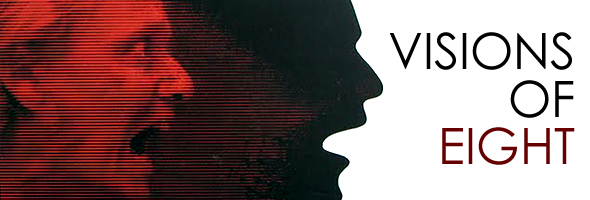

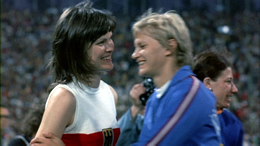
Sports documentaries can be a very diverse bunch, and nowhere is that more evident than ones centering around the Olympics. Something about the global athletic competition brings out a range of visual interpretations unlike anything else on earth, ranging from Kon Ichikawa's Tokyo Olympiad to Leni Riefenstahl's Olympia. Ichikawa returned to the same subject eight years after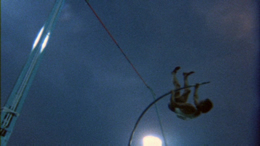 his first film and joined seven other filmmakers for this ambitious project, which features international filmmakers focusing on whatever aspects of the 1972 Munich Summer Games they wished. Of course, history had a major shock in store when Israeli athletes were massacred by Black September, a tragic event with violent repercussions for years to come. However, the film itself is mainly a snapshot of the games from a more artistic and optimistic vantage point, often turning into a sort of trace-like art film with bodies in motion turning the screen into a kinetic playground. The end result is less a unified whole than an unorthodox entry in the string of international anthology films, which gave different directors the chance to tie together various short films into a feature with one common theme.
his first film and joined seven other filmmakers for this ambitious project, which features international filmmakers focusing on whatever aspects of the 1972 Munich Summer Games they wished. Of course, history had a major shock in store when Israeli athletes were massacred by Black September, a tragic event with violent repercussions for years to come. However, the film itself is mainly a snapshot of the games from a more artistic and optimistic vantage point, often turning into a sort of trace-like art film with bodies in motion turning the screen into a kinetic playground. The end result is less a unified whole than an unorthodox entry in the string of international anthology films, which gave different directors the chance to tie together various short films into a feature with one common theme.
Juri Ozerov (Stalingrad) kicks the film off with "The Beginning," a 10-minute impressionistic overview of preparations for the games including athlete arrivals, training, and a rapid-fire montage of moments to come. From there it's a diverse whirlwind of perspectives: Mai Zetterling (who made the switch to directing after a successful acting career) takes a look at bodybuilders including a hilarious look at the massive quantities of protein needed to sustain them in "The Strongest;" while Arthur Penn (Bonnie & Clyde) gets downright hallucinatory with "The Highest," a dreamlike, slow-motion study of pole vaulting (including 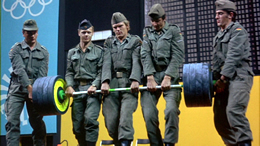 some nifty reverse shots and a few painful blunders). Michael Pfleghar turns his camera to the female contestants (some with huge afros!) including a gorgeous gymnastics passage in "The Women," while Ichikawa also uses slow motion and handheld POV shots to capture the 100-meter dash in "The Fastest."
some nifty reverse shots and a few painful blunders). Michael Pfleghar turns his camera to the female contestants (some with huge afros!) including a gorgeous gymnastics passage in "The Women," while Ichikawa also uses slow motion and handheld POV shots to capture the 100-meter dash in "The Fastest." 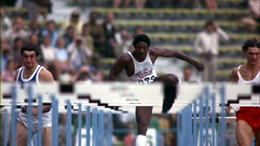
Milos Forman's quirky "The Decathlon" mixes European chanting, yodeling, and varying film speeds (intercut with some surprising shots of a music conductor!), while the great and still undervalued Claude Lelouch scores the most unexpected and memorable segment with "The Losers," an alternately hilarious and wrenching look at the athletes whose dreams didn't come true, sometimes in spectacularly pouting fashion. The most stylistically extreme installment comes last with John Schlesinger's "The Longest," which intercuts footage of runners (partially from the perspective of one British athlete) with internal fantasias reflecting their state of mind along with the only overt acknowledgement of the tragic events at the ceremony. Apart from the source music, Visions of Eight also features a wildly varied music score by Henry Mancini, who was definitely swerving into a more daring mode around that period including the next year's 99 and 44/100% Dead. It's a fun score on its own terms, too, though the soundtrack is now impossibly difficult to find for a reasonable amount of money.
Independently released by Cinema 5, Visions of Eight was produced by David L. Wolper, who was hot off of the odd combo of Willy Wonka & the Chocolate Factory and The Hellstrom Chronicle. Wolper retained control of the film, licensing it out to Columbia Pictures for an '80s VHS release before the film went out of circulation for a very, very long time. The 2011 feature-only DVD from Olive Films is obviously a considerable step up over that one as well as the occasional TV airings; most of it looks great, though the occasional reliance on zoom lenses and distressed film stocks means some shots look prettier than others. Overall it's a fine, accurate presentation of a unique film, and the mono audio sounds very good as well with that Mancini music trumpeting through loud and clear.
![]()